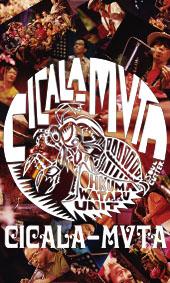Fire in the Fire
CICALA-MVTA Live photograph movies 2007.
プãƒãƒ•ã‚£ãƒ¼ãƒ«ã«è¿½åŠ ã™ã‚‹ | ã‚‚ã£ã¨è¦‹ã‚‹
「ã‚ã‚‹é“化師ã®é€±æœ«ã€on 29th Nov. 2008 at Takutaku,Kyoto
Cicala-Mvta is One of Japanese Most Exciting and Original Groups. Both Traditional Chindon and the Retro-futuristic Sound of Cicala-Mvta is an Entirely Natural Combination of the Old and New, the East with the West. (Amazon review)
Cicala Mvta is a group described by some UK music critics as the most impressive exponents of contemporary Japanese grass roots music. The music presents old-fashioned and brass band music. Featuring chindon, a kind of Japanese drum, saxophones, clarinets and tubas, Cicala Mvta's music is a kind of street music originally played at funerals or the openings of local shops. But the band blends the cheesy music with social critique, thus creating a sarcastic outlook, in both its musical style and in its stage performance. (TAIPEI TIMES By Yu Sen-lun Jun 18, 2004)
Before TV commercials, drum and woodwind bands would march through the streets of Japan carrying banners advertising products or stores. Bandleader WATARU OKHUMA modelled his band after these Chindon groups and named it CICALA-MVTA .(Pronounced Shi-ka-la Moo-ta, it means Mute cicada after the epitaph of a great Japanese street singer songwriter) All in all, it is a wild ride, as Cicala Mvta views klezmer, Balkan, Turkish, early jazz and free jazz music through their Japanese street band lens, which has something to do with topology and physics and their bent view of musical reality. (Radio National ;Australia)
THE NAME OF THE BAND
It derives from the inscription on the epitaph of Soeda Azembo(1872--1944) ; a legendary street singer.
“ A CICALA-MVTA CHE CANTAVA E LA SVA MOGLIE CHE L' AMAVA â€
(The mute cicada that sang and his wife who loved him)
This is from the epitaph for Soeda Azembo (mute cicada) the greatest street singer-song-writer of popular music in Japan, before the 1920's --- the beginning of the days of mass culture. In those days the street-singers used to sing and sell the songbook on the street. And the incredible point is that before radio broadcast and SP records, his comical and sarcastic songs often became a mega-hit in the whole country. Also he is known to create the first modern protest song in the movement of the early socialists in Japan. His pen-name derives from the ironic humor that the "mute cicada" loudly sang ! But it was not humorous , that after the mid1920's, the hard oppression of the militant totalitarism and the development of mass culture industry got him really mute.
WHAT IS "JINTA" ?
The first western music formally imported into Japan was brassband-music as a part of military technology, like in many other colonized countries. The military brassbands not only played marching music but also western classics, to demonstrate the western music to the people. At first it was entirely a high-culture.thing. But it didn't take a long time to find it's cheap imitators. Most of those commercial bands were recognized in official to be vulgar or kitsch , but lots of them became be popular in downtown Tokyo. People intimately called those bands "Jinta" , one of the predecessors of chin-don.
--SHORT HISTORY--
1960 OHKUMA Wataru born in HIROSHIMA pref.
1979 He started music career in an avan-garde rock band in TOKYO
1985 He met CHIN-DONG tradition and started clarinet
1994 He organised his own band later named CICALA-MVTA
1998 CICALA-MVTA released their 1st albumâ€CICALA-MVTAâ€
2000 The 1st Euro tour around 8 countries more than 20 cities
including at ROYAL FESTIVAL HALL (London with BLUR),BBC radio recording,etc.
2001 The 2nd album “DEKOBOKO†was released
2002 The 2nd Euro tour including Roskilde festival(Denmark), Roots festival (Holland),etc.
2003 appeard at FUJI ROCK FESTIVAL (japan)
2004 released the 3rd album “GHOST CIRCUSâ€
petit-CICALA-MVTA appeard at THE ASIAN MUSIC FESTIVAL (Taiwan Chiayi)
ã‚¢ãƒãƒ³ã‚®ãƒ£ãƒ«ãƒ‰ã¨ãƒãƒ³ãƒ‰ãƒ³ã®ã‚¹ãƒˆãƒªãƒ¼ãƒˆé‚ãŒ
絶妙ã«ã‚·ã‚§ã‚¤ã‚¯ã•ã‚ŒãŸå¤§ç†Šãƒ¯ã‚¿ãƒ«ã®ã‚¯ãƒ©ãƒªãƒ
ットã«ã€ã‚µãƒƒã‚¯ã‚¹ã€ãƒ´ã‚¡ã‚¤ã‚ªãƒªãƒ³ã€ã‚®ã‚¿ãƒ¼ã€
トãƒãƒ³ãƒœãƒ¼ãƒ³ã€ãƒ†ãƒ¥ãƒ¼ãƒã€ãƒ‰ãƒ©ãƒ ãŒåˆºæ¿€çš„ã‹
ã¤çµ¶å¦™ã«çµ¡ã‚€ã€‚
ãƒãƒƒã‚¯ã€ã‚¸ãƒ£ã‚ºã€ãƒˆãƒ©ãƒƒãƒ‰â€¦ã‚らゆるジャン
ルã®åž£æ ¹ã¯å®Œç’§ã«è¸ã¿ã«ã˜ã‚‰ã‚Œã€ã‚·ã‚«ãƒ©ãƒ ー
ã‚¿ã®ç ´å£Š--å†ç”Ÿã®ãƒ¡ãƒªãƒ¼ã‚´ãƒ¼ãƒ©ã‚¦ãƒ³ãƒ‰ã«ä¹—ã£ã
¦ã€ã™ã¹ã¦ã¯çˆ†ç¬‘ã¨å·æ³£ã®æ¸¦ã«å·»ãè¾¼ã¾ã‚Œã¦ã
„ã。
「æ±äº¬ã‚¢ãƒ³ãƒ€ãƒ¼ã‚°ãƒ©ã‚¦ãƒ³ãƒ‰ã®åº•åŠ›ã€ã¨è¨€ã‚ã‚Œ
ãŸæ›²è€…æƒã„ã®è¶…ç•°æ‰é›†å›£ã«ã‚ˆã‚‹è„³å¤©ç›´æ’ƒã‚µã‚¦
ンドã¯ã€å›½å†…外ã§å¸¸ã«å響を呼ã³ç¶šã‘ã¦ã„ã‚‹
。
ï¼‘ï¼™ï¼™ï¼”å¹´é ƒã‚ˆã‚Šã€ã‚¯ãƒ©ãƒªãƒãƒƒãƒˆå¥è€…大熊ワ
タルãŒãƒªãƒ¼ãƒ€ãƒ¼ã¨ãªã‚Šæ´»å‹•ã‚’始ã‚ãŸã€Œå¤§ç†Šäº˜
ユニットã€ã‚’ã€ï¼™ï¼—å¹´ã‚らãŸã«ã€Œï¼£ï¼©ï¼£ï¼¡ï¼¬
A--ï¼ï¼¶ï¼´ï¼¡--シカラムータ--ã€ã¨å‘½åã€æˆ¦å‰
ã®å¤§é“æ¼”æŒå¸«ãƒ»æ·»ç”°å”–è‰åŠã®å¢“碑銘--下記--ã
«ã¡ãªã‚“ã§ã„る。
「 A CICALA-MVTA CHE CANTAVA ELAS VA MOGLIE CHE L'AMAVA ã€
----「æŒã‚’æŒã£ãŸå£°ãªãè‰ã¨å½¼ã‚’æ„›ã—ãŸãã®å¦
»ã«ã€ã®ã€Œå£°ãªãè‰ã€--
1998年ã€åˆã‚¢ãƒ«ãƒãƒ 『 シカラムータ ã€ã‚’発表。
1999年ã€ãƒ¨ãƒ¼ãƒãƒƒãƒ‘ã§ã®ï¼£ï¼¤é…給開始。
ï¼’ï¼ï¼ï¼å¹´ã€å¤ã®ãƒ¨ãƒ¼ãƒãƒƒãƒ‘8ヶ国2ï¼æ•°ãƒ¶
所ã«ã‚ãŸã‚‹ãƒ„アーã§å響を呼ã¶ã€‚
ï¼’ï¼ï¼ï¼‘å¹´ã€ï¼’ndアルãƒãƒ 『 凸凹--dekoboko-- ã€ç™ºè¡¨ã€‚
ï¼’ï¼ï¼ï¼’å¹´ã€å†ã³ãƒ¨ãƒ¼ãƒãƒƒãƒ‘ã®ãƒ•ã‚§ã‚¹ãƒ†ã‚£ãƒ
ル巡æ¥ã€‚
ï¼’ï¼ï¼ï¼”å¹´ã€ï¼“rdアルãƒãƒ 『 GHOST CIRCUS ã€ç™ºè¡¨ã€‚
ï¼’ï¼ï¼ï¼–å¹´ã€å…¬å¼ãƒ©ã‚¤ãƒ´ç›¤ã€ï¼”æžšç›®ã®ã‚¢ãƒ«ãƒ
ムã¨ãªã‚‹ã€Žç”Ÿè‰ã€€namazemiã€ç™ºè¡¨ã€‚å°åŒ—市主催ã
€ŒTaipei Art Festivalã€ã«å‡ºæ¼”。
ã¾ãŸã€TBS「 NEWS23 ã€ã€NHK-FM「 セッション5ï¼ï¼• ã€ã€ 英BBCラジオ 〠独ZDF ãªã©ã€æ”¾é€å‡ºæ¼”も多数。
--主ãªå‡ºæ¼”コンサート--
â— FUJI ROCK FESTIVAL'03 --ï¼’ï¼ï¼ï¼“--
â—デンマーク〠Roskilde Festival --ï¼’ï¼ï¼ï¼’--
â—アムステルダムã€Roots Festival--ï¼’ï¼ï¼ï¼’--
â—ãƒãƒ³ãƒ‰ãƒ³ãƒ»ãƒãƒ¼ãƒ“カンセンターã€Urbanbeat Festival--ï¼’ï¼ï¼ï¼‘--
â—ドイツ・ルドルシュタットã€Tanz&Folk Festival--ï¼’ï¼ï¼ï¼--
â—ãƒãƒ³ãƒ‰ãƒ³ãƒ»ãƒã‚¤ãƒ¤ãƒ«ãƒ•ã‚§ã‚¹ãƒ†ã‚£ãƒãƒ«ãƒ›ãƒ¼ãƒ«
〠BLUR ã®ã‚ªãƒ¼ãƒ—ニングアクト--ï¼’ï¼ï¼ï¼-- →Paul FISHERã«ã‚ˆã‚‹ãƒ©ã‚¤ãƒ´ãƒ»ãƒ¬ãƒãƒ¼ãƒˆ--英語--
â—横浜寿町フリーコンサート--1999/ï¼’ï¼
ï¼ï¼--
★â€æ¥½éšŠâ€ã®è¡Œé€²ã®ã‚ã¨ã«ã¤ã„ã¦ã„ãå°‘å¹´ã«
ã€ç§ã‚’ã‚‚ã©ã—ã¦ãã‚Œã¾ã—ãŸã€‚大熊ã•ã‚“ã®ã‚¯ãƒ©
リãƒãƒƒãƒˆã«ã—ã³ã‚Œã¦ã„ã¾ã™ã€‚-- å°æ²¢æ˜ä¸€ /俳優--
★ブレーã‚ã®ã¨ã‚ŒãŸãƒ¤ãƒãƒã‚·ã‚¢ãƒ³ãƒ»ãƒˆãƒ©ãƒƒãƒ‰
。ユーラシアを迷走ã™ã‚‹ã€æœˆå¤œã®ç‚ºã®ãƒ¦ãƒ‹ã‚¾
ン放å±ã‹ã€ã¯ãŸã¾ãŸå¹å¥ã‹ã€‚ベスト・コンãƒ
ã«ã‚·ã‚«ãƒ©ãƒ ータを。ã•ã‚ã€ã‚¢ã‚¤ãƒ©ãƒ¼é”を呼ã¹
。俺も三線をæŒã£ã¦è¡Œã“ã†ã€‚ --ä¸å·ã€€æ•¬/ SOUL FLOWER UNION--
★大熊ワタルã«ã¨ã£ã¦ã€ãŠãらãã™ã¹ã¦ã¯ãƒ‚
ンタãªã®ã 。ãƒãƒ«ã‚«ãƒ³ãƒ»ãƒ‚ンタã€ãƒãƒ«ãƒˆãƒ¼ã‚¯
・ヂンタ……ãã—ã¦ã‚¢ãƒ´ã‚¡ãƒ³ãƒ»ãƒ‚ンタ。真ã®
独創性ã¯æ€ã„ãŒã‘ãªã„ã¨ã“ã‚ã‹ã‚‰ã‚„ã£ã¦ãã‚‹
。--平井 玄/音楽評論家--
★ã“れをè´ã‹ãšã—ã¦ã€æ—¥æœ¬ã®ã‚¸ãƒ£ã‚ºã‚’云々ã™
ã‚‹ã®ã¯ã‚ã¾ã‚Šã«ã‚‚ä¸æ¯›ã 。-- スイング・ジャーナル 誌 ä½è—¤è‹±è¼”--
